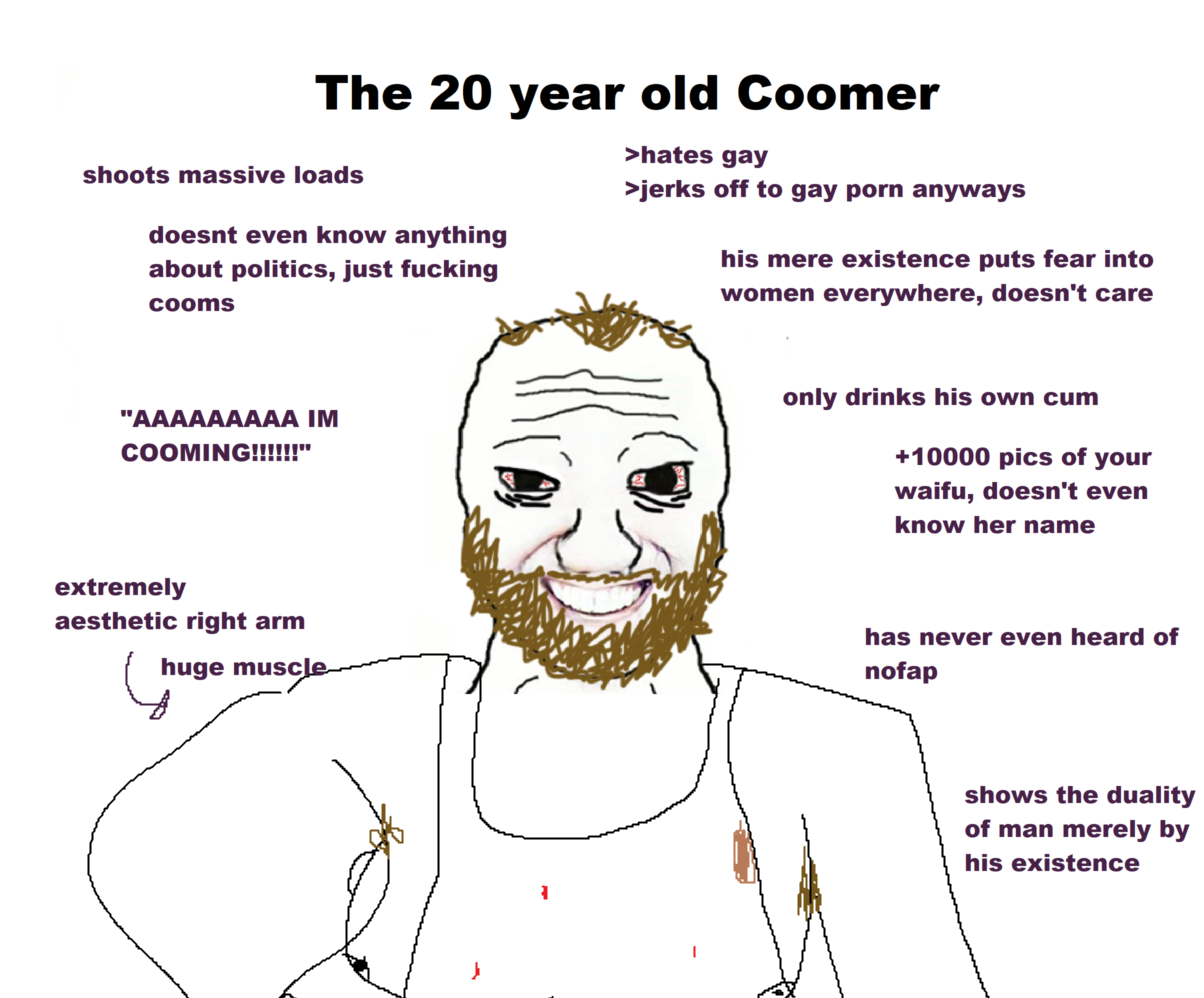Beyond The Meme: Unpacking 'Coomer' In Digital Culture
In the vast, ever-evolving landscape of the internet, new terms and memes emerge daily, shaping our online discourse and reflecting societal shifts. Among these, the term "coomer" has carved out a distinct, albeit controversial, niche. More than just a fleeting meme, it encapsulates a complex interplay of internet culture, social commentary, and stereotypes, often sparking heated discussions across various online platforms.
Understanding "coomer" goes beyond its surface-level appearance as a simple internet jest. It delves into the underlying currents of how we perceive and discuss online behavior, addiction, and even broader political ideologies. This article aims to dissect the multifaceted nature of the term, exploring its origins, its usage as a critique, its connection to specific online platforms, and the wider implications it holds for digital literacy and responsible online engagement.
Table of Contents
- What Exactly is a "Coomer"? Defining the Digital Stereotype
- Origins and Evolution: Tracing the "Coomer" Meme's Journey
- Beyond the Addiction: "Coomer" as a Tool for Critique and Social Commentary
- The Digital Ecosystem: Coomer and Content Platforms
- Societal Implications: Stereotypes, Discourse, and Well-being
- Cultivating Media Literacy in the Age of Memes
- Responsible Digital Engagement: A Call to Action
- Conclusion: Navigating the Nuances of Online Culture
What Exactly is a "Coomer"? Defining the Digital Stereotype
At its core, the term "coomer" emerged from the depths of internet culture as a pejorative label, a shorthand used to describe a specific type of online behavior. Based on common understanding derived from extensive online discussions and meme usage, **a coomer is a stereotypical degenerate porn addict**. This definition, widely circulated in various online communities, paints a vivid, albeit exaggerated, picture of an individual consumed by their online habits, often to the perceived detriment of their real-world responsibilities, social interactions, and personal well-being.
The visual representation often associated with the meme typically depicts a gaunt, unkempt figure with bloodshot eyes, hunched over a glowing screen, reinforcing the idea of a person utterly absorbed and negatively affected by excessive online content consumption. It’s a caricature, designed to be instantly recognizable and evoke a specific reaction, often one of disdain, mockery, or even concern. This immediate recognition is precisely what allowed the term to spread rapidly and become a widely understood, if controversial, label for a particular type of online user.
It's crucial to understand that while "coomer" is a stereotype, its widespread adoption suggests it resonated with certain anxieties and observations about contemporary digital behavior. It serves as a cultural artifact reflecting broader discussions about internet addiction, the accessibility of explicit content, and the potential impact of online life on an individual's offline existence. While it simplifies a complex issue, its very existence highlights a shared, albeit often unspoken, concern within digital communities.
Origins and Evolution: Tracing the "Coomer" Meme's Journey
Like many viral internet phenomena, the "coomer" meme didn't appear out of nowhere. Its genesis can be largely attributed to the notorious imageboard, 4chan, a platform known for its unfiltered discussions, rapid meme generation, and often provocative content. As one user aptly observed in an online forum, **"I seen coomer appear on 4chan as the meme I posted."** This initial appearance on 4chan's highly influential, albeit often controversial, boards marked the beginning of its journey into broader internet consciousness. 4chan's anonymous nature and fast-paced environment are fertile ground for new concepts to emerge and evolve rapidly, often without clear authorship.
From 4chan to Reddit: The Meme's Viral Spread
From its 4chan origins, the "coomer" meme, like countless others, found its way to other major platforms, most notably Reddit. Reddit, often described as a place where you **"Get a constantly updating feed of breaking news, fun stories, pics, memes, and videos just for you,"** served as a powerful amplifier for the "coomer" meme, exposing it to a much wider and more diverse audience. While 4chan might have been its birthplace, Reddit provided the fertile ground for its evolution and widespread adoption. On Reddit, the meme transformed, adapting to various subreddits and contexts, often appearing in threads discussing online habits, self-improvement (such as "NoFap" communities), or even political commentary.
The spread wasn't always straightforward or universally accepted. As noted in some online discussions, the meme's emergence could even be interpreted through a lens of inter-community rivalry: **"Most of /pol assumed it was an operation by their sworn enemy the tranny discords as they call them."** This highlights the often-factionalized nature of online communities, where the origin and purpose of a meme can be debated, attributed to rival groups, and even used as a tool in ongoing ideological battles. This complex origin story underscores how memes are not just funny pictures but can be potent instruments in shaping narratives and influencing perceptions within the digital sphere.
Beyond the Addiction: "Coomer" as a Tool for Critique and Social Commentary
While initially a derogatory term, the "coomer" meme quickly evolved beyond a simple insult. It became a versatile template, a visual shorthand used to express a variety of critiques, both explicit and implicit, about modern society and online culture. This adaptability is key to understanding its longevity and impact in online discourse, allowing it to transcend its original narrow definition.
Critiquing Pornography and Online Habits
The most direct and immediate application of the "coomer" template is, predictably, to critique excessive pornography consumption and the perceived negative consequences associated with it. It serves as a stark, albeit exaggerated, warning about the potential pitfalls of unchecked online habits. Discussions around this aspect often touch upon themes of addiction, detachment from reality, the erosion of healthy social interactions, and the impact on mental health. The meme provides a powerful visual anchor for these discussions, making complex issues more accessible and shareable in the fast-paced world of online communication. It simplifies the often-taboo subject of porn addiction into a recognizable, if crude, symbol, allowing for quick commentary.
Mocking "Woke Sexual Politics"
Perhaps more controversially, the "coomer" template also found utility in broader cultural and political critiques. As observed in online commentary, **"The template is used to critique not only pornography but also woke sexual politics in general (such as to mock the idea that sex work...)."** This extension of its use highlights how internet memes can be co-opted to comment on a wide range of societal issues, often with a satirical or mocking intent. By associating certain progressive viewpoints on sexuality, gender, or social justice with the "coomer" stereotype, the meme attempts to delegitimize or mock these ideas, often through ridicule and oversimplification. This particular usage frequently sparks intense debate, revealing deep ideological divides within online communities and beyond, as it touches upon sensitive topics with a dismissive tone.
It's crucial to recognize that when used in this manner, the "coomer" meme transitions from a commentary on individual behavior to a weapon in cultural wars, often simplifying complex social issues into easily digestible, and frequently inflammatory, caricatures. This demonstrates the immense power of memes to influence public opinion and shape narratives, for better or worse, by leveraging humor and visual cues to convey strong, often polarizing, messages.
The Digital Ecosystem: Coomer and Content Platforms
The existence and relevance of the "coomer" meme are inextricably linked to the platforms that host and distribute the very content it references. The internet's vastness means that content of all kinds is readily available, leading to the proliferation of aggregation sites that compile material from various sources. This digital ecosystem plays a crucial role in the spread and context of the "coomer" phenomenon.
Coomer.party and Content Aggregation
The mention of specific platforms like `coomer.party` and its association with content from sites like `fanlsy` and `onlyfans` is highly significant. As one user inquired, highlighting a common concern among users of such sites, **"Excuse me does coomer.party update itself cause there are a whole of ppl missing from fanlsy and onlyfans example i can only see cjclarkofficial free account, not his ppv another issue i'm having."** This indicates that `coomer.party` functions as a content aggregation site, presumably compiling and hosting content, including free and pay-per-view (PPV) material, from other creator-based platforms. Similarly, `Partylib` is described as **"an advanced bulk downloading tool created by me, available for use on kemono & coomer."** These details paint a clear picture of an ecosystem where content, often from subscription-based or exclusive platforms, is collected, shared, and even bulk-downloaded, raising serious questions about copyright infringement, consent, and the ethics of content distribution. Such platforms operate in a legally ambiguous space, constantly battling issues of content freshness, completeness, and legality, as they often re-host content without explicit permission from the original creators.
Navigating Technical Issues: When Platforms Seem "Down"
In the dynamic and often unpredictable digital realm, technical glitches are an unavoidable reality. The phrase **"Coomer may appear to be down, and idk if this will help you, If you are on pc, and you have antivirus on, check to see if it is being blocked by it (avg is good at this)"** points to common user frustrations when trying to access online content, especially from less conventional or more niche sites. This advice is a general troubleshooting tip applicable to any website that might be inaccessible. Antivirus software, while crucial for protecting users from malware and cyber threats, can sometimes mistakenly flag and block legitimate (or perceived as legitimate by the user) websites, leading to access issues. This highlights the practical challenges users face when navigating the internet, beyond just the content itself, and the constant interplay between user intent and security protocols.
It also subtly underscores the nature of some of these aggregation sites, which might operate in a way that triggers security warnings or are perceived as risky by antivirus programs, leading users to believe the site is "down" when it's merely being blocked by their own protective software. This further complicates the user experience and the reliability of such content aggregation platforms, adding a layer of technical complexity to the user's interaction with the "coomer" ecosystem.
Societal Implications: Stereotypes, Discourse, and Well-being
The "coomer" meme, while a product of internet culture, has broader societal implications that extend beyond its digital confines. Its existence and widespread use reflect and reinforce certain stereotypes about online behavior and its impact on individuals. The portrayal of the "coomer" as a "degenerate porn addict" contributes to a simplified and often stigmatizing view of complex issues like addiction, mental health, and healthy sexuality. This over

Understanding The Coomer Meme – VJMP

Introducing, The Coomer : virginvschad
Coomer: Understanding The Modern Phenomenon